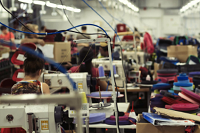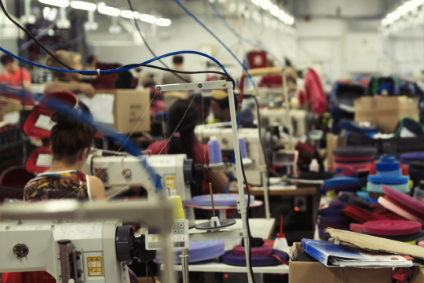FW
Held annually during the first weekend in October, Denim Days Festival has been postponed due to COVID-19. The Erwin Chamber hosts Denim Days Festival each year to celebrate the time when Amsterdam was known as the ‘Denim Capital of the World.’ This title came from when denim manufacturing was a thriving industry in Erwin Mill. The Erwin Mill, operated by Burlington Industries and later Swift Textiles, closed in 2000.
The Denim Days Celebration is a family event featuring concerts, performances, food and craft vendors, information booths, collectible and vintage cars, a parade, rides and slides for the kids and the annual Baby Denim Contest. Coats Area Chamber of Commerce also postponed the annual Farmers Day celebration until 2021 alongiwth Angier’s Crepe Myrtle Festival and Benson’s Mule Days.
Cancelling its upcoming show at Javits Centre in New York, Curve, the lingerie brand of Eurovet America’s has introduced Curve Connect, a virtual offering scheduled to be held from September 13-25, 2020.
The virtual event will be powered by the Grip platform, which will enable the brand to focus on matchmaking within its lingerie and foundation-wear community. Through this experience, the brand expects to offer greater opportunities to emerging brands. The event will focus on matchmaking, networking and zoom meetings.
Curve will continue with the virtual component event after the restrictions are lifted, allowing its events to be hosted on-site. Over the last few months, the brand has cultivated a global audience through its webinars and digital offerings.
Kitex Garments, a global player in the infant wear segment, has deferred all its investment plans, considering the muted demand scenario amid uncertain market conditions in the export market. The company had investments worth Rs 920 crore last year. It had also envisaged a Rs 2,000-crore investment plan by 2025.
After a complete washout of March and April, the company has started shipping 3.5 lakh pieces per day since May, compared to 7.5 lakh on average in the pre-COVID-19 days. However, it initially faced some operational issues due to COVID-19 regulations. The company employs a massive workforce of 11,000 to meet its production requirements, which gives rise to certain risks. However, it managed to mitigate these risks by totally quarantining the factory and restricting both inward and outward movement of workers.
This year, the company also faced a production loss of around Rs 55 crore in March and April, following the total lockdown in the county. Delay in availability of raw materials from Tirupur, Gujarat and Coimbatore as well as supply chain disruptions forced the company to cut down production. However, it managed to minimize these obstacles to meet its export obligations.
Garment makers in Punjab are urging the state government to extend the moratorium on payment of loan installments. Around 10,000 textile units in Ludhiana have urged Punjab government to waive fixed electricity charges. The Punjab garment industry is staring at massive losses on account of almost 70 per cent drop in orders for winter wear in the wake of the coronavirus pandemic. The industry manufactures winter wear during June, July and August.
Most factories in the state are running at just 30-35 per cent capacities, Ludhiana-based garment makers said. The sharp fall in orders for winter garments is a double blow for the industry, which already suffered a setback with buyers cancelling or putting on hold orders for summer wear because of COVID-19 pandemic. Besides, there is uncertainty about demand for winter wear after September month.
Industry representatives pointed out that fashion products or garments manufacturing units would bear the maximum brunt of this fall in demand. Vinod Thapar, President, Knitwear Club of India said, as people do not have money they are likely to spend only on essential items rather than purchasing non-essential fashion wear.
The Central Bank of Nigeria (CBN) has allocated N50billion intervention fund for the textile industry. The fund will be administered at 4.5 per cent interest by the Bank of Industry (BoI), announced CBN in a release titled “Non-Interest Guidelines for Intervention in the Textile Sector”.
The funds would be used to resuscitate the ailing textile sector, restructure facilities and provide further facilities for textile firms with genuine need for intervention. The one-off intervention will terminate by December 31, 2025.
Activities to be covered in the Cotton Textile Garment (CTG) scheme include cotton ginning (lint production), spinning (yarn production), textile mills, integrated garment factories (for military, para-military and schools and other uniformed institutions).
Textile companies with an existing facility in the books of BoI under the CTG scheme, and those with existing facilities in Deposit Money Banks/Non Interest Financial Institutions (NIFIs) are not allowed to participate in these activities.
 For decades, suppliers have been made a scapegoat by fashion companies and the same is true during COVID-19 as well. Taking undue advantage of the ongoing pandemic, companies have either been exploiting the loopholes in their contracts to cancel orders or voluntarily changing the terms of supplier agreements. Some companies are renegotiating contract terms leaving little room for disagreement from suppliers, says Global Insight. For instance, Arcadia has threatened to cancel orders if suppliers do not accept its ‘proposal’ of a 30 per cent discount.
For decades, suppliers have been made a scapegoat by fashion companies and the same is true during COVID-19 as well. Taking undue advantage of the ongoing pandemic, companies have either been exploiting the loopholes in their contracts to cancel orders or voluntarily changing the terms of supplier agreements. Some companies are renegotiating contract terms leaving little room for disagreement from suppliers, says Global Insight. For instance, Arcadia has threatened to cancel orders if suppliers do not accept its ‘proposal’ of a 30 per cent discount.
Terming these agreements as asymmetric and unfair to suppliers, Ben Vanpeperstraete, Garment Policy Adviser, Traidcraft Exchange, says they enable brands to either ignore or amend provisions favorable to buyers. Fiona Gooch, Senior Private Sector Policy Advisor of the firm advises buyer companies to honor their original contracts and pay for orders, or pay for liability.
Traidcraft Exchange, says they enable brands to either ignore or amend provisions favorable to buyers. Fiona Gooch, Senior Private Sector Policy Advisor of the firm advises buyer companies to honor their original contracts and pay for orders, or pay for liability.
Suppliers take the final call
However, the ultimate responsibility to hold these companies accountability lies with suppliers, says Christie Miedema, Campaign and Outreach Coordinator, Clean Clothes Campaign. According to her, suppliers agree to buyers’ terms as they know buyers can source garments from elsewhere if they don’t agree. Suppliers also fail to use their legal rights due to fear of costs associated with transnational litigation, adds Vanpeperstraete. Hence, laws should be made with due diligence to hold these companies accountable.
More meat to laws
According to Els de Wind, Co-Chair of the IBA Global Employment Institute, laws need more strength to tackle multinational companies. They should address the issues of national employment law, labor law and public law and also advance the obligatory frameworks and bilateral investment treaties between supplier and buyer countries’. Scott Nova, Executive Director, Worker Rights Consortium, advises suppliers to act collectively across countries as it would give them a lot of leverage.
The Bangladesh Garment Manufacturers and Exporters Association (BGMEA) recently threatened to ban Edinburgh Woollen Mill (EWM) as the company was requesting up to 70 per cent discounts from suppliers. The association is also raising awareness about the actions of other buyers. Once suppliers make this into public issues, companies are forced to change their stance as for them their reputation matters most, says Nova.
Some brands are indeed taking action to address cancellations. For instance, Primark has committed to pay for all orders planned for handover by April17, 2020. The brand believes that solution to this problem cannot be achieved by individual companies, it needs collective action.
 Fashion analysts including McKinsey believe brands and retailers, who successfully navigate through COVID-19 crisis, will drive new online customer experiences, product information transparency and seamless payments and delivery. In a recent article ‘The fashion market needs a reset’ published in MobileMarketing Mike Owen says, for such brands data will become an important medium to create a single analytics platform to improve decision-making on core processes as planning, buying, promotions, markdowns, and in-season inventory management.
Fashion analysts including McKinsey believe brands and retailers, who successfully navigate through COVID-19 crisis, will drive new online customer experiences, product information transparency and seamless payments and delivery. In a recent article ‘The fashion market needs a reset’ published in MobileMarketing Mike Owen says, for such brands data will become an important medium to create a single analytics platform to improve decision-making on core processes as planning, buying, promotions, markdowns, and in-season inventory management.
McKinsey’s latest survey had shown, though customers are buying more through online channels, brands need to create a new vision to attract them and providing accurate product information data can be ones of the ways to achieve this.
Adapting to changing consumer behavior
In his article Owen says post-COVID, fashion consumers are likely to spend more through mobile channels. Hence, brands need to customize their product assortment, values and their medium of sale. Retailers also need to be careful about store and product selection and align it with local data and customer preferences and an omnichannel presence.
customize their product assortment, values and their medium of sale. Retailers also need to be careful about store and product selection and align it with local data and customer preferences and an omnichannel presence.
In addition, brands will have to improve their supply chain partnerships and flexibility. They would have to update or expand their websites besides consolidating their partnerships with back-end manufacturers and marketplace platforms such as Amazon and Alibaba.
Being transparent
In its report on the influence of ‘woke’ among GenZ, McKinsey states a majority of Generation Z consumers hold companies responsible for addressing environmental and social issues. They will keep a close watch on companies’ commitment to their social campaigns and their strategic and operational decisions. For consumers, a company’s product and operational transparency will hold greater importance.
Henceforth, consumption will become more need-based as consumers will be more cautious about the products they buy. They will prefer to buy products that are ‘must have’ instead of ‘nice to have’.
Futurists like Doug Stephens advise brands to use this time to reinvent operations and offer more alternatives and values to customers. They can also use cross-functional teams to break down siloes and prioritize on customer experience and data management. Owen argues post COVID, product information and knowledge will play a greater role in attracting shoppers. Consumers will be drawn by accurate and detailed product information visible in every sales channel.
Brands can integrate their product information management with new tech investment to seamlessly curate information for digital and wholesale showrooms. They can explore applications such as livestreaming, digital store assistants (WeChat), and virtual sampling to improve their interaction with customers and present their products in real-time. To achieve this, brands need to reduce their supplier costs, increase flexibility, decrease time to market, and minimize returns and cancellations.
Greater communication between brands and consumers
Wade Eagar, Head-Retail, Facebook UK opines the pandemic has accelerated mid- to long-term business plans of fashion brands. They are rushing to execute plans originally budgeted for a five-year period. Many brands have a management team comprising entrepreneurial millennials who have the ability to quickly innovate and adapt their offerings according to needs.
Eduard Pietrade, SonaeIM also agrees that future approach to retail needs to be based on the interaction between people, brands, technologies and customer interaction. To bring more trust and confidence into the market, brands will need not only be more transparent but also embrace their consumers’ shift to online channels.
An industry coalition representing a wide spectrum of domestic personal protective equipment (PPE) producers and the US textile industry outlined policy principles and objectives needed for reshoring and safeguarding domestic PPE manufacturing.
The coalition–including such organizations as the National Council of Textile Organizations, National Cotton Council and SEAMS–said the COVID-19 pandemic, which exposed severe shortages in the country’s PPE supply and “an over-reliance on foreign sourced products, underscores how important it is for the U.S. government to incentivize, support and maintain domestic manufacturing capacity for PPE.”
The coalition called on Congress and the Trump administration to adopt principles it outlined through legislation, executive order and other appropriate means. The principles will meet current needs and ensure a reliable domestic PPE manufacturing base capable of meeting our public health needs during a future crisis, the coalition said.
The principles include creating strong domestic procurement rules for federal PPE purchases so that taxpayer funds don’t go to China and other offshore PPE producers and “create the stable demand for U.S.-made PPE that will incentivize investment in domestic PPE manufacturing.
The group also called on the government to provide funding assistance for companies to reconstitute domestic PPE supply chains” to help companies repurpose their factories and purchase equipment to ramp up production, and supply grants or tax credits for companies that make such investments.
Jide Zeitlin, Chairman, Tapestry Inc, the parent company of the Kate Spade, Stuart Weitzman and Coach, has resigned from the company and board for personal reasons, effective immediately.
Zeitlin, who had been chairman since November 2014, took over as CEO in September 2019 after the New York-based company ousted its then-CEO Victor Luis.
Zeitlin was among only four Black CEOs of Fortune 500 companies. Joanne Crevoiserat, chief financial officer, has been appointed interim CEO of Tapestry while the company searches for a successor. The company said it will look at both internal and external candidates.
Todd Kahn, president and chief administrative officer and company secretary, will serve as interim chief executive officer and brand president of Coach. Andrea Shaw Resnick, global head of investor relations and corporate communications, has been named interim chief financial officer. In addition, Susan Kropf, the company’s lead independent director, has been appointed chair of the board.
Fiber giant Hyosung has expanded its 100 per cent recycled multi-function fiber offering, which it will present at Outdoor Retailer Online show from July 21-23, 2020.
In addition to Hyosung’s new GRS 100 per cent recycled creora regen spandex collection, the company will highlight the new recycled polyester and nylon yarns (among others) with added performance features during Outdoor Retailer Online.
It will highlight Hyosung’s 100 per cent recycled regen askin polyester with cooling technology offers cool touch, UV protection and rapid drying features created for those who like to play hard in the sun. With every tonne of 100 per cent reclaimed waste Hyosung uses to produce its GRS certified creora regen spandex, consumers will be happy to know it is saving approximately 2 tons of non-renewable raw material being extracted from the earth, the company says.
Hyosung’s Mipan regen robic is the first GRS certified recycled high-tenacity nylon made from 100% reclaimed waste developed for eco-conscious enthusiasts who rely on their gear wherever the adventure takes them.
Hyosung has increased its digital marketing initiatives to participate in virtual trade shows and events such as Outdoor Retailer Online and the recent Kingpins24 and Performance Days online shows. The company is also developing new Hyosung Performance Textiles social platforms to include a forthcoming blog along with LinkedIn, Instagram and YouTube pages, which will go live in August 2020.












